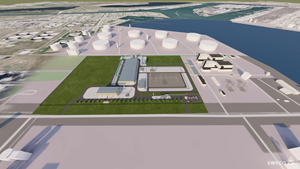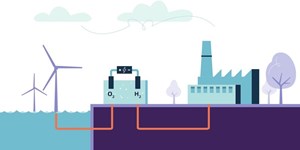News
Eneco takes significant step towards building green H2 plant
Eneco has submitted its planning application for the construction of the Eneco Electrolyzer, a green H2 production plant in Rotterdam’s Europoort industrial area. Green H2 is produced using electricity generated by renewable energy. Eneco is working together with Mitsubishi on this through the Eneco Diamond H2 joint venture. By building the plant, Eneco can help industrial customers make their processes and products more sustainable.
“Producing green H2 is essential for a successful energy transition,” said Eneco CEO, As Tempelman. “When direct electrification is not possible, green H2 is a good and sustainable alternative, both as a raw material and as a fuel. Investing in green H2 is an important part of our strategy and it pleases me that we can now take concrete steps towards this.”
An electrolyzer is a H2 plant that splits water into H2 and oxygen using electricity. The Eneco Electrolyzer will use renewable energy from solar parks and wind farms to produce clean H2 that’s initially aimed towards the industrial sector. At the moment, the sector uses natural gas - a fossil fuel - to produce H2. Moreover, H2 could eventually replace natural gas as a fuel in the industrial and electricity sectors and play a part in more flexible production of electricity.
The Eneco Electrolyzer will be developed next to the Enecogen power station in Europoort. This location means the two facilities can share some infrastructure, which has advantages with regards to costs and realization time. The Eneco Electrolyzer will have a capacity of eventually 800 megawatts. This means it will be able to produce up to 80 kilotons of H2 every year, depending on the amount of renewable energy available and the demand for green H2 from the industrial sector.
Improving the sustainability of industrial customers is in keeping with Eneco's One Planet Plan, which aims to make Eneco and all its customers climate neutral by 2035. In addition, the Netherlands and Europe have set targets for the production of green H2. The Netherlands, for example, intends to increase green H2 production capacity to 4 gigawatts by 2030.
Eneco has submitted its planning application now in the expectation that it will be able to work towards building the Eneco Electrolyzer over the next few years. Construction is scheduled to start in 2026, and the H2 plant is currently scheduled to start operating in 2029.



